Deloitte China and Pudu Robotics release Robot white paper
发布时间:2025-05-13 16:20分类: 无 浏览:189评论:0
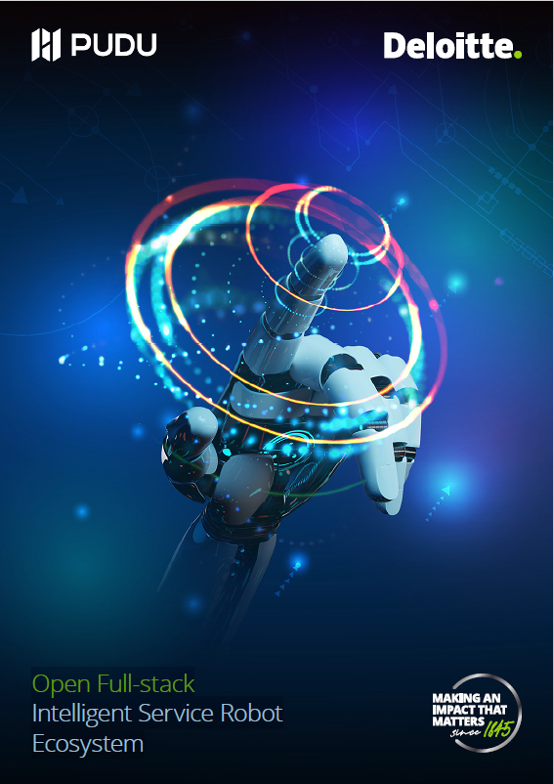
On 24 April, Deloitte China and Pudu Robotics released the "Open Full-stack Intelligent Service Robot Ecosystem" white paper. This first in-depth study of the development of the global service robot industry ecosystem reveals the development path of the second era of commercial service robots and proposes the first set of environmental, social, and governance (ESG) practice guidelines for the industry.
Through systematic data analysis and field investigations, the white paper deeply analyzes development trends in the global service robot industry and sets out its development direction and future opportunities

According to the white paper, the global service robot market is entering a period of explosive growth, driven by multiple factors such as key technological innovations, policy support in various countries, industrial transformation and upgrading, and demographic changes. Overall scale and demand growth in the industry are strong, with opportunities and challenges coexisting.
To navigate increasingly complex market demands and the growing diversity of application scenarios—and the inflection point emerging in the second era of the commercial service robot industry,it is critical to propose an open, full-stack robotics ecosystem to promote the wide-ranging deployment and coordination of robots, realize a seamless collaborative general ecosystem, promote service robots to move towards general-purpose embodied AI, and usher in larger-scale commercialization.
According to the white paper, the service robot sector has entered a period of rapid development, with strong growth in market size. In 2025, the global market will reach USD40 billion. Over the coming decade, the market is expected to grow at a compound annual growth rate of 17.1%, potentially reaching USD195 billion by 2035, indicating large growth potential.
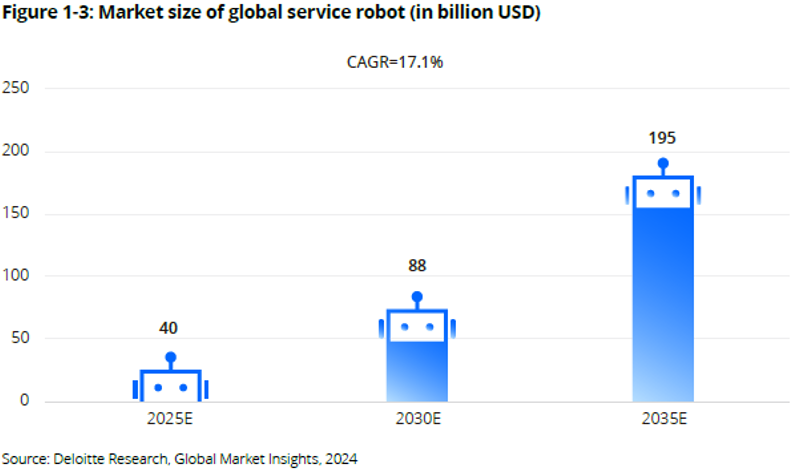

The white paper also shows how the commercial service robot industry, as the first subsector of the service robot industry, has taken a demonstrative and leading role. The past decade marked the first era of the commercial service robot industry, and it has now entered its second era with broader space for development.
The open full-stack intelligent service robot ecosystem is not only a technical architecture, but also an innovative ecology that integrates product technology and business models. The construction of the ecosystem requires progress on several fronts: product diversification, the integration of mobility, manipulation and interaction functions, and the development of multiple robotic forms, from specialized platforms to humanoid designs. Through the establishment of industry standards and the innovation of multiple technology stacks, this ecosystem will bring profound changes to the global service robot industry and promote the realization of general embodied AI and large-scale commercial popularization of service robots.
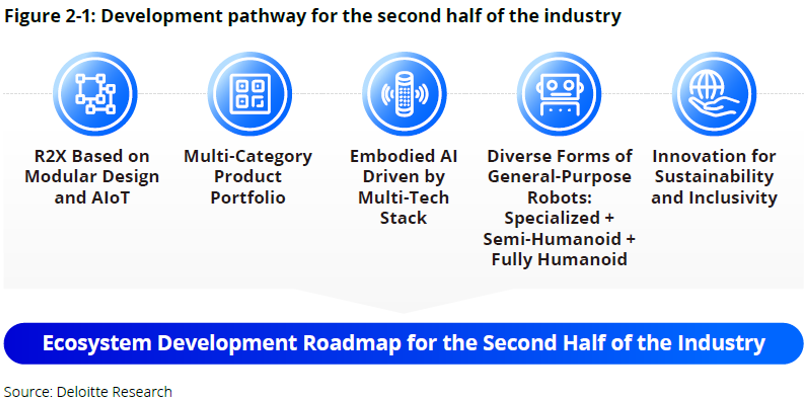
It is the key technical foundation for realizing an open full-stack intelligent service robot ecosystem that will promote the realization of an open, inclusive industry. For example, In January 2024, Pudu Robotics proposed the world's first Robot-to-Everything (R2X) technical architecture. Addressing industry barriers that hinder openness and collaboration, R2X is based on the deep integration of modular design and Artificial Intelligence of Things (AIoT) technology.
The white paper points out that the open technology system will break down industry barriers, realize R2X "Internet of Everything", significantly reduce the deployment threshold of service robots, benefit a wider range of user groups, and promote the healthy development of the robot industry.


The study also points out that the development of user needs in the service robot market are diverse and complex, with scenarios unmet in the past needing to be solved urgently. Entering the second era of the industry, through the transformation of business models, leading robot companies are building a general multiple product matrix to provide users with one-stop solutions covering all scenarios. This is sharply reducing learning, use, management, and maintenance costs for users, creating a consistent, efficient, and complete user experience and realizing full-stack embodied AI.
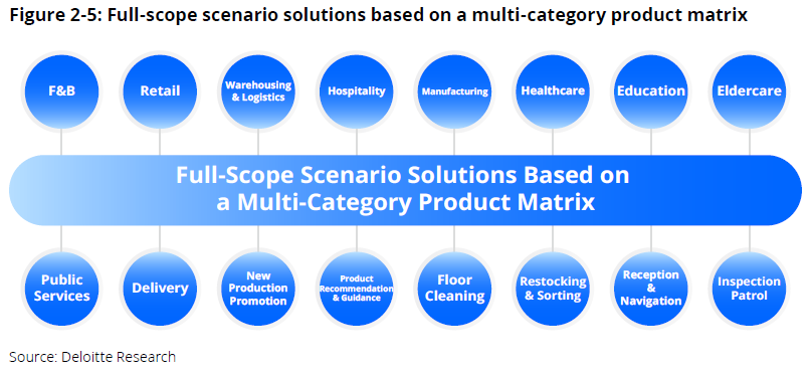
The white paper references Pudu Robotics’ pioneering concept of "Degrees of Freedom per Unit Work Area", pointing out that the three main forms of robot: specialized, semi-humanoid, and humanoid, have their own adapted application scenarios, together shaping a complete ecosystem of general-purpose embodied robots.
According to the white paper, by 2050, global shipments of semi-humanoid robotswill surpass shipments of humanoid robots, reaching 12.507 billion and 10.005 billion units.
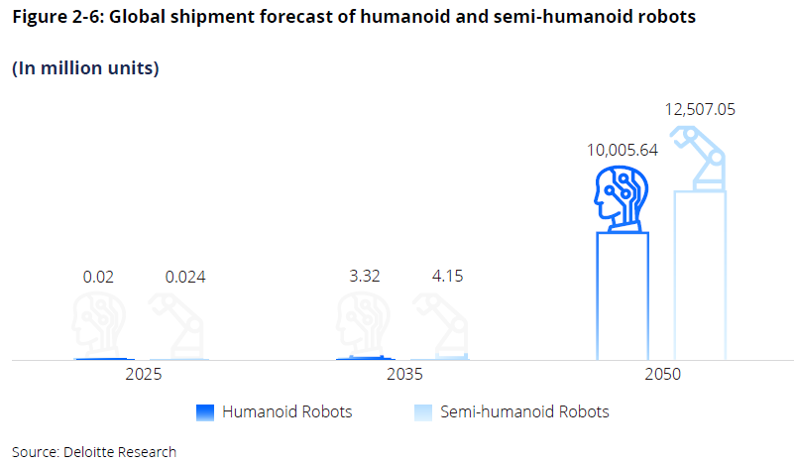

The white paper mentions that in the past, the service robot industry was often dominated by a single technology, which limited product functions and user experience. Entering the second era of the industry, the development of multi-technology stacks with mobility, manipulation, and interaction as their key elements has become inevitable. Driven by multiple technology stacks, it is foreseeable that embodied AI, with multimodal perception, autonomous decision-making, and dexterous operation as the core features, will become an important driver promoting the development of a full-stack intelligent ecosystem.
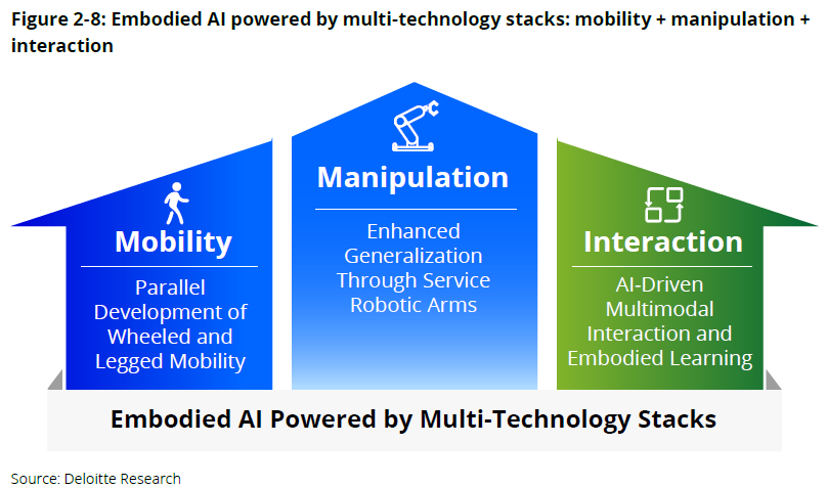
Manipulation, for example, is a key technology stack for robots to achieve versatility and generalization. Service robot arms enable robots to perform varied tasks across different scenarios. According to the white paper, it is estimated that global market demand for service robotic arms will exceed 45 billion units by 2050, leveraging vast market space, which will drive the vigorous development of related industries.
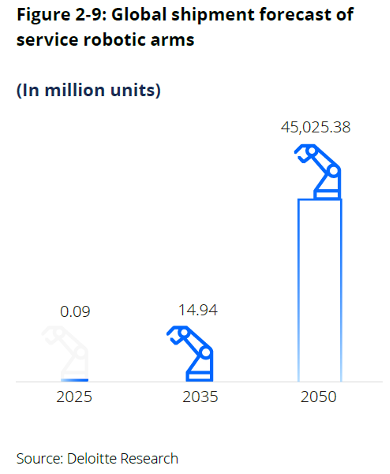

According to the white paper, service robots are increasingly breaking free from scenario and industry limitations to promote the universal penetration of technology, from in-hospital medication delivery to companionship and care in elder care settings; from auxiliary logistics in industrial environments to lightweight applications for small businesses. This innovation not only reduces carbon footprint, but also lowers the economic cost of digital transformation and from a social perspective enhances human well-being and service accessibility. It therefore creates a virtuous cycle of technological empowerment and sustainable development, shaping a new model for an inclusive, sustainable service robotics industry.


As the world's first ESG practice guide for the service robot industry, the white paper proposes general solutions for the sustainable development of service robot companies across green supply chain (E), global compliance certification (S), and information security and privacy protection (G).
The white paper shows that Pudu Robotics' solutions have been implemented in more than 60 different scenarios in 10 major industries worldwide, with an average annual carbon reduction of 50,000 tons, equivalent to replanting 27,000 hectares of forest. With the iteration of technology and the opening of the ecosystem, service robots will become the core fulcrum of ESG strategies in various industries and promote the realization of global sustainable development goals.
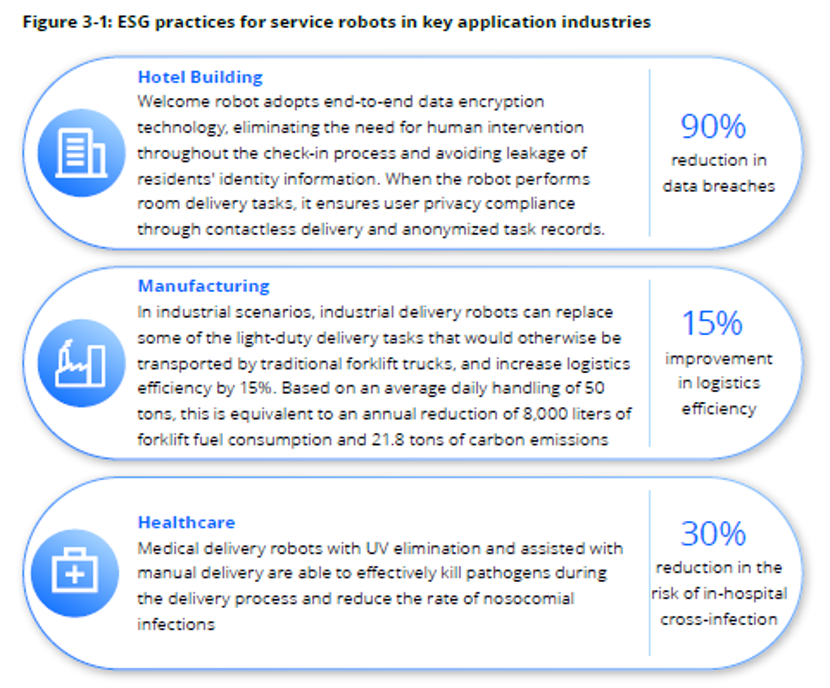
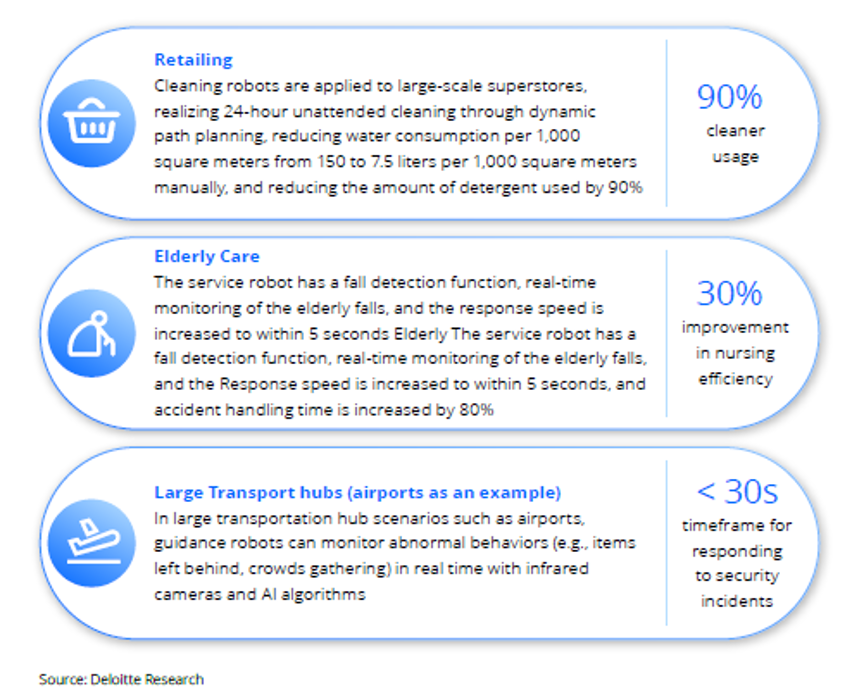
The open full-stack intelligent service robot ecosystem will benefit the innovation and development of the entire robot industry, as well as lead innovative practices and promote the large-scale commercial application of service robots globally. The ecosystem will also pave a win-win path of collaborative innovation for the industry.
About Pudu Robotics
Pudu Robotics is a leading brand in global service robots, committed to using robotics technology to create truly useful robot products and improve the efficiency of human production and life. Pudu Robotics focuses on the R&D, design, production, and sales of service robots, with its three core technologies of "mobility, operation, and AI", and takes the lead in realizing the complete layout of specialized, semi-humanoid, and humanoid robot products in the industry. At present, Pudu Robotics has three product lines: service, cleaning, and industry, and its products have been widely used in 10 major industries and scenarios such as catering, retail, hotels, medicine, entertainment and sports, industrial manufacturing, and education. The company's business has expanded to more than 60 countries and regions, with cumulative shipments of more than 90,000 units.
Please click "Read more"
Read the report
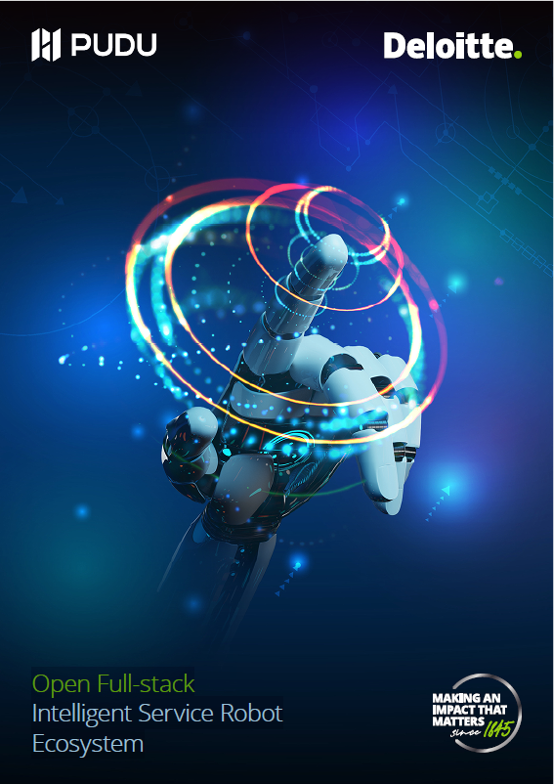
For more information, please contact:
Energy, Resources & Industrials
CNERI@deloittecn.com.cn
Disclaimer:
A 3rd party wanting to repost a Deloitte Wechat article should publish the content in its original form, without amendment. Any changes to content should be sent to Deloitte for review and approval before being released. The 3rd party is required to attach the information and disclaimer below to the reposted article:
This communication contains general information only and, while authorization for its publication has been granted, copyright is reserved by Deloitte Touche Tohmatsu, and none of Deloitte Touche Tohmatsu Limited, its member firms or their related entities (collectively, the "Deloitte Network") is, by means of this communication, rendering professional advice or services. No entity in the Deloitte network shall be responsible for any loss whatsoever sustained by any person who relies on this communication.

Please click "Read more" to read the report.
Reminder: Due to constraints associated with WeChat's interface, if you are unable to download the report after opening Deloitte's web page, please tap "Option" in the upper right hand corner and open it in a browser to download.
- 排行
-
- 12025科技特长生招生正式开启!一文了解科技特长生政策趋势,开启升学快通道→
- 2携手华为,共创金融新纪元 —— 赢时胜亮相2024华为全联接大会,共绘金融科技生态蓝图
- 3跨境百科 | 2025 TEMU春夏女装新品重点揭晓!
- 4理论深度分析Autosar CAN 时间同步
- 5GPA低到“蕉绿”?大一到大四处处都是补救翻盘机会!
- 6联咏科技:引领显示驱动芯片创新,布局未来显示技术版图
- 7工薪家庭无负担!免学费!低成本留学就去这三个国家!
- 8China-Serbia Youth International Cultural Exchange Program Ends!
- 9满心热爱,奔赴星辰!英华2024-2025学年开学典礼圆满举行
